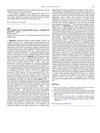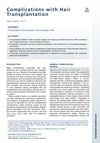
Search
for
Sort by
Research
300-330 / 760 results

research Molecular Interactions of New Pregnenedione Derivatives
The new progesterone derivatives effectively inhibit 5α-reductase and bind to the androgen receptor.

research Effects of the Anti-Androgen Finasteride on 5-Alpha-Reductase Activity in Human Gingival Fibroblasts in Response to Minocycline
Finasteride helps treat hair loss by blocking enzyme activity.

research Effects of the Anti-Androgen Finasteride on 5α-Reduction of Androgens in the Presence of Progesterone in Human Gingival Fibroblasts: Modulatory Actions of the Alkaline Phosphatase Inhibitor Levamisole
Finasteride reduces testosterone conversion, progesterone lessens this, and levamisole enhances finasteride's effect.

research Female Pattern Hair Loss Possibly Caused by Tamoxifen: Androgen Receptor Expression in the Outer Root Sheath in the Affected Area
Tamoxifen may cause female hair loss by increasing androgen receptor expression.

research Prostate Specific Antigen as a Predictive Factor for Androgenemia in Women
PSA can help diagnose high androgen levels in women.

research Mouse Models with a Disrupted PTHrP Gene or a Disrupted PTH Gene (PTH−/− Mice)
PTHrP is important for bone formation and may be targeted for osteoporosis treatment and longevity therapies.

research Non-Competitive Androgen Receptor Inhibition In Vitro And In Vivo
Two new compounds can block androgen receptor activity in different ways and may lead to new treatments for androgen-related diseases.

research Drug-Induced Hair Loss and Hair Growth
Some drugs can cause hair loss or increase hair growth, but these effects are usually reversible when the drug is stopped.

research Zinc: An Essential Trace Element for Parenteral Nutrition
Zinc is crucial for nutrition, especially in patients with specific health conditions, and requires careful supplementation and monitoring.

research Effect of Aminopterin on Epithelial Tissues
Aminopterin strongly suppresses epithelial tissues and can treat certain skin conditions but has significant side effects.

research Diagnosis and Management of the Dermatologic Manifestations of Polycystic Ovary Syndrome
The document concludes that accurate diagnosis and personalized treatment are important for skin problems in women with PCOS.

research Management of Acne
Acne treatment varies, with topical and systemic therapies effective, and more research needed on treatment order and long-term effects.

research Medical Treatment of Hirsutism
The conclusion is that the best initial treatment for hirsutism is usually oral contraceptives, with the addition of antiandrogens or insulin sensitizers if needed, and topical eflornithine or laser treatments as supplementary options.

research How Should Postmenopausal Androgen Excess Be Evaluated?
Evaluate postmenopausal women with high androgen levels using medical history, physical exams, lab tests, and imaging to manage health risks.

research New 5α-Reductase Inhibitors: In Vitro and In Vivo Effects
Four new compounds were more effective than finasteride in treating prostate issues and hair loss, with one being 100 times more active and safe for use.

research Minoxidil Increases 17β-Hydroxysteroid Dehydrogenase and 5α-Reductase Activity in Cultured Human Dermal Papilla Cells from Balding Scalp
Minoxidil boosts enzymes that help hair growth.

research Dihydrotestosterone Inhibits Hair Growth in Mice by Inhibiting Insulin-Like Growth Factor-I Production in Dermal Papillae
Dihydrotestosterone (DHT) stops hair growth in mice by lowering a growth factor important for hair.

research New Approaches to the Treatment of Osteoporosis
Future osteoporosis treatments should focus on increasing bone growth, with many promising options available.

research The Optimal Indication for Testosterone Replacement Therapy in Late-Onset Hypogonadism
Testosterone replacement therapy should be used for men with low testosterone levels and symptoms of hypogonadism, after careful diagnosis and considering individual needs.

research Therapeutic Androgen Receptor Ligands
Androgens and SARMs play a role in body mass, frailty, skin health, and hair growth, and are used in treating prostate cancer, acne, and hair loss, with potential for new uses and improved versions in the future.

research Complications with Hair Transplantation
Hair transplant complications are rare with good planning and technique, but risks include infection, bleeding, and patient dissatisfaction.

research Enzyme-Linked Immunosorbent Assays for Doping Control of 5α-Reductase Inhibitors Finasteride and Dutasteride
New tests detect finasteride and dutasteride in urine quickly and easily.

research The Effect of Minocycline on the Metabolism of Androgens by Human Oral Periosteal Fibroblasts and Its Inhibition by Finasteride
Minocycline may cause hair loss by increasing DHT levels, but finasteride can help counteract this effect.

research Lisinopril-Induced Alopecia: A Case Report
Lisinopril, a heart medication, probably caused hair loss in a patient, which stopped after switching drugs.

research Big Head? Bald Head! Skull Expansion: Alternative Model for the Primary Mechanism of Androgenetic Alopecia
The paper suggests that hair loss might be caused by skull growth, not just DHT's effect on hair follicles, and calls for more research.

research Confocal Microscopy Can Assess the Efficacy of Combined Microneedling and Skinbooster for Striae Rubrae
Microneedling combined with skinbooster effectively treats striae rubrae, with confocal microscopy confirming collagen changes.

research Androgens in SARS-CoV-2 Coronavirus Infections
Men, particularly those with hair loss, are more likely to get the virus, and those with prostate cancer may have milder symptoms. Testosterone's role in the disease is unclear, and the virus doesn't seem to harm male fertility. Women with PCOS might be at higher risk. More research is needed.

research Ovarian Leydig Cell Tumor and Postmenopausal Hirsutism with Signs of Virilization
A woman's excessive hair growth and masculine features were due to a rare benign ovarian tumor and endometrial cancer, which improved after surgery.

research Ishige Sinicola Extract Stimulates Osteoblast Proliferation and Differentiation via the Bone Morphogenetic Protein 2/Runt-Related Gene 2 Signaling Pathway
Ishige sinicola extract helps bone-building cells grow and mature, which could aid in treating osteoporosis.